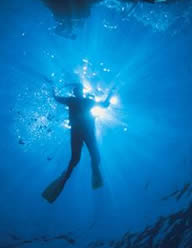|
Featured Companies
| Scuba U in Burbank, IL |
| |
| Lake County Divers Supply in Hobart, IN |
| |
| Farallon USA Inc in Tucker, GA |
| |
| Sweetman's Diving & Salvage in Beaver Dam, WI |
| |
| All About Diving in Cumming, GA |
| |
| Dive Addicts in Draper, UT |
| |
| Underwater Adventures in Long Beach, CA |
| |
| Scubas World in Hialeah, FL |
| |
| Advanced Diving INTL in Red Bank, NJ |
| |
| Houston Underwater Club in Houston, TX |
| |
| Jacques Custodian Hull & Prop in Cape Coral, FL |
| |
| Harbor Dive Service in Gig Harbor, WA |
| |
| Aquatic Fabricators of S FL in Hallandale, FL |
| |
| Table Rock Marina in Branson, MO |
| |
| Red River Scuba LLC in Bossier City, LA |
|
|
Scuba Trainers
There are four different levels of scuba training certifications you can obtain with enough time in the water. These range in difficulty from the Basic Open Water designation to the expert Dive Con training course which is only open to master scuba divers. At the very minimum, many scuba shops will require you have your Open Water certificate before they will take you out on the water.
As mentioned, the Basic Open Water scuba training course is the entry-level class for beginner divers. Novice divers will be taught the concepts of scuba diving and how to use the various equipment safely in a swimming pool before they are permitted to attempt any open water dives of their own. If you choose to pursue your diving hobby further, the next step is to take an Advanced scuba training course, which exposes you to more challenging dive situations than the Basic class. To become certified as a Master Scuba Diver, you must go through extensive scuba training and become certified in four other related specialties. The highest level certification you can obtain is the Dive Con designation. People who go for this level of scuba training are usually seeking to become scuba instructors themselves.
Advanced Search:
|
